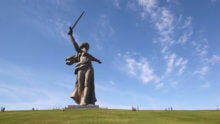The Russian Empire: Major Accomplishments

The Russian Empire was one of the largest empires in the world, spanning almost 14 square miles (36 million sq km) across eastern portion of Europe and the continent of Asia.
The Russian Empire’s population was 170 million people of over 100 different ethnic and religious backgrounds.
The Russian Empire emerged as one of the great world powers and played a leading role in international events, like the War of 1812 and World War I.
Alexander II’s Great Reforms included the peaceful emancipation of approximately 20 million serfs.
The Russian Empire was a bastion of revolutionary activity, which ultimately led to the Bolsheviks’ seizure of power in the 1917 October Revolution.
The Russian Empire produced several revolutionary and anarchist thinkers and activists: Alexander Herzen, Michael Bakunin, Nicholas Chernyshevsky, George Plekhanov, and Vladimir Lenin.
The Russian Empire founded one of the great metropolitan cities of the world: St. Petersburg.
The Russian Empire completed the 5,778-mile (9,198 km) Trans-Siberian railway.
The Russian Empire had the Pulkov observatory, which was the center of astronomical studies during the nineteenth century.
The Russian Empire produced several outstanding mathematicians and scientists, such as Nicholas Lobachevsky, Dmitry Mendeleev, Peter Lebedev, and Alexander Popov.
The Russian Empire produced such buildings as the Winter Palace, Catherine Palace, Alexander Palace, Kazan Cathedral, the Admiralty, and St. Isaac’s Cathedral.
The Russian Empire produced several outstanding poets: Alexander Pushkin, Alexander Blok, and Anna Akhmatova.
The Russian Empire produced some of the greatest writers in western literature: Nicholas Gogol’s Dead Souls (1842); Ivan Turgenev’s Fathers and Sons (1862); Tolstoy’s War and Peace (1865-69), Anna Karenina (1875-77); Dostoevsky’s Crime and Punishment (1866), The Idiot (1868-69), The Devils (1871-72), The Brothers Karamazov (1879-80); and Anton’s Chekhov’s The Seagull (1896), Uncle Vanya (1897), Three Sisters (1901), and The Cherry Orchard (1903-04).
The Russian Empire produced several outstanding musicians: Modest Petrovich Mussorgsky, Nicholas Rimsky-Korsakov, Alexander Borodin, Peter Tchaikovsky, Alexander Scriabin, and Igor Stravinsky.
The Russian Empire produced world-renown ballets, such as Sleeping Beauty (1890), The Nutcracker (1892), and Swan Lake (1895) with the Bolshoi Ballet emerging as one of the leading ballet companies in the world.
Also available are “The Russian Empire (1721-1917),” “The Russian Empire: The Amber Room,” and “The Russian Empire Timeline.”




